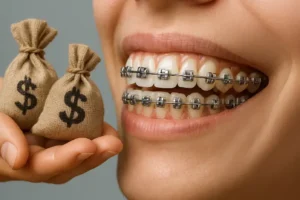
Have questions about how braces work, what they cost, or how long treatment takes? VIP Smiles Orthodontics has you covered in our braces FAQ section. We’re here to make the process easier to understand, and even easier to start. For personalized answers, call (601) 321-9216 and schedule your consultation.
1. How long will I need to wear braces?
Treatment time varies depending on the complexity of your case. Most people wear braces for 18 to 24 months, though some may need less time and others more. Factors such as age, bite alignment, and how well you follow your orthodontist’s instructions can influence the timeline. Regular appointments and proper care help ensure your teeth move as planned and your treatment stays on track. Your orthodontist will give you a more precise estimate after your initial evaluation.
2. Do braces hurt?
You may feel some discomfort or soreness after getting braces or following adjustments. This is a normal sign that your teeth are shifting. The tenderness usually lasts a few days and can be managed with soft foods and over-the-counter pain relief if needed. Most patients adapt quickly and find the sensation becomes less noticeable over time. If you experience sharp or prolonged pain, contact your orthodontist to check for issues such as a loose bracket or protruding wire.
3. What foods should I avoid while wearing braces?
Hard, sticky, or chewy foods can damage braces or make cleaning difficult. Examples include hard candies, popcorn, chewing gum, and nuts. Biting into raw carrots or apples should be done cautiously—cut them into smaller pieces instead. Avoiding these items helps prevent broken brackets and wires, which can delay treatment. Your orthodontist will provide a complete list of foods to steer clear of and recommend braces-friendly alternatives that keep your teeth and appliances safe.
4. How often will I need to visit the orthodontist?
Most patients visit their orthodontist every four to eight weeks. These appointments allow for adjustments to your braces, progress checks, and any necessary repairs. The exact schedule depends on your treatment plan and how your teeth respond to movement. Regular visits are important to keep treatment on track and prevent delays. If you experience issues such as loose wires or brackets, you may need to schedule an extra visit to have them fixed promptly.
5. Can I still play sports with braces?
Yes, you can continue playing sports with braces, but wearing a mouthguard is essential. A properly fitted mouthguard protects your teeth, gums, and braces from injury during contact or high-risk activities. Your orthodontist can recommend the best type for your situation. Avoiding mouth protection increases the risk of damage to your braces and possible injury to your mouth. With the right precautions, you can safely stay active while undergoing orthodontic treatment.
6. How do I clean my teeth with braces?
Braces create more surfaces where food and plaque can collect, so thorough cleaning is important. Brush after every meal using a soft-bristled toothbrush and fluoride toothpaste, making sure to clean around brackets and wires. Floss daily using a floss threader or water flosser to reach between teeth and under wires. Rinsing with water or mouthwash can also help remove debris. Good oral hygiene prevents staining, cavities, and gum problems during treatment, helping ensure healthy results once braces are removed.
7. What should I do if a bracket or wire comes loose?
If a bracket or wire becomes loose, contact your orthodontist as soon as possible to arrange a repair. In the meantime, orthodontic wax can be placed over sharp edges to protect your mouth from irritation. Avoid trying to fix or remove the appliance yourself, as this could cause more damage. Keeping the area clean and avoiding hard foods until your appointment will help prevent further issues. Prompt repairs keep your treatment progress on track.
8. Will braces affect my speech?
Some people notice slight changes in speech during the first few days after getting braces, especially if they have appliances on the inside of their teeth. This is temporary, as your mouth quickly adjusts. Practicing speaking, reading aloud, or singing can help speed up the adjustment process. Most patients return to their normal speech patterns within a week or two. If you notice ongoing difficulties, your orthodontist can check for any appliance-related issues that might be contributing.
9. Can I whiten my teeth while wearing braces?
It’s generally best to wait until after braces are removed to whiten teeth. Whitening during treatment can cause uneven results because the areas under the brackets will not be exposed to the whitening agent. Once your braces come off, you can whiten your teeth for a more uniform shade. In the meantime, maintaining excellent oral hygiene helps minimize staining and discoloration so your smile looks bright and healthy after treatment.
10. What happens after my braces come off?
When your braces are removed, your orthodontist will fit you for a retainer. Retainers hold your teeth in their new positions while the surrounding bone and tissues stabilize. You’ll receive instructions on how often to wear it, which is especially important in the first year after treatment. Wearing your retainer as directed is the key to maintaining your results and avoiding tooth movement. Regular dental checkups will also help keep your smile healthy and aligned.
Find the Answers You Need in Our Braces FAQ
Navigating orthodontic treatment can feel overwhelming without the right guidance. Our braces FAQ is a great starting point for understanding what to expect during treatment, from start to finish. At VIP Smiles Orthodontics, we believe that an informed patient is a confident one. If you still have questions or want to discuss your options in person, we’d love to hear from you. Call (601) 321-9216 to schedule your consultation and get the answers you need from our experienced team.